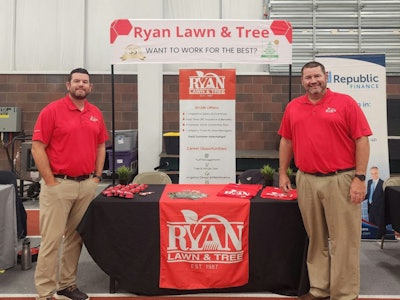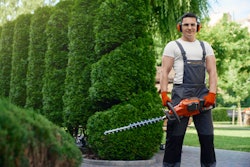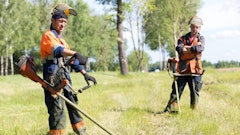
Recruitment and retention at Ryan Lawn & Tree in Merriam, Kan., is a round-the-clock effort.
“If recruiting, hiring and keeping great people is not your No. 1 priority, you'll never have a consistent No. 2,” says Larry Ryan, president of Ryan Lawn & Tree. “You need to just continue to look everywhere and never stop looking. Oftentimes, you hire your very best person when you don't need somebody. The reason is when you don't need people, you don't lower your standards on what you want.”
Colleges and career fairs, job forums, employee incentives—you name it, Ryan Lawn & Tree has probably done it.
Ryan details how the company achieves this and explains how it has bettered the company in the long run.
Recruit the right people
Ryan Lawn & Tree only accepts 6% of its applicants and prides itself on the happiness of its employees.
First, the company looks for hardworking leaders who are assertive.
“When I say assertive, I mean that if they feel like something is right or wrong, they will share it, and introverts will do that,” Ryan says. “Introverts sometimes are the very best leaders because they're good listeners.”
Qualities such as good people skills, continual learners, a hunger to succeed and a generally positive attitude also top the list of what Ryan Lawn & Tree looks for in future employees.
“Happy people who are our employees attract about half of our people. If you have a grumpy person, you don't want to keep that person because they will hurt your recruiting,” Ryan says. “You have to be really selective on who you keep. If you bring somebody in and they are a misread, you cannot keep them. The right person tends to keep themself motivated. They have to like the work. If they don't like the work, either you've got to move them to a different seat on the bus, or they can't stay.”
Additionally, Ryan adds that having employees who get along well and who share common interests also keeps the company culture overall positive.
“If they don't like each other, you're fighting an uphill battle forever," Ryan says.
Teach them well
When new hires are onboarded, they go through orientation and an apprenticeship program where they work in all the departments for a few weeks to a couple of months. Not only does this help the company, Ryan says, but it also makes for a more well-rounded employee.
“That way, they really find out what their gifts are, and we want them to grow in that area, but also if they have a little experience in other departments, they’ll cross-sell for us better,” Ryan says. “They'll also be a better landscaper overall.”
Along the way, the company also makes use of learning coaches, who keep new hires on track and who check in on them to make sure they’re still doing well.
“We want them to continue to learn,” Ryan says. “You hear about burnout but it's due to boredom most of the time. So then it becomes how can we reinvent you on the job to get you excited.”
Provide feedback
Ryan says receiving corrective feedback more than once a year in evaluations and seeing a clear career path are not just important—they’re huge.
“People are being evaluated today based on their goals," Ryan says. "Then the managers work with our people to make sure they're setting goals that are pertinent, goals that challenge the person, goals that, when you accomplish them, really make you put in a good day's work.".
Ryan Lawn & Tree also grades team members with an A, B or C. For all of the C players, if the company doesn’t think they can become A or B players, it looks at replacing them.
“The more of your existing people that you upgrade into higher quality, the more you attract better quality in the future,” Ryan says. “Your A and B players ought to be helping you grow, and if they are, then you're always going to have room for the next A and B player that you hire. We say if companies aren't growing, they're dying. So, if you're not growing because of your people, you're probably not as good as you think.”
While some companies get rid of the bottom 10% of employees, Ryan says he disagrees with that policy—the company only does so if the bottom 10% are bad players.
Feedback is a two-way street, and Ryan Lawn & Tree consistently also asks for feedback from its employees. The company administers a Gallup survey twice a year asking employees a series of 12 questions about their job, their satisfaction and more.
Ryan will be the first to admit that the company has areas that it can work on.
“The first time we took it, we were changing software, and the survey showed they were upset,” Ryan says.
The company also recently hired HR personnel who administered a nine-block system, a performance assessment tool that can help identify employees who are ready for promotions and other career advancements.
“It helps determine whether you’re promotable or if you can become the very best craftsman in the world,” Ryan says. “We need both. Some people think you aren’t important until you become a boss, but we work hard to break that attitude because a really great craftsman is just as important as the boss. They just have different jobs.”
Continue learning
As employees grow, Ryan Lawn & Tree encourages them to continue learning. For example, the company encourages employees to attend trade shows and conferences and offers courses through its Ryan University program for continual education. If employees choose not to take them, that may disqualify them for a promotion.
In the wintertime, the field staff puts on Toastmasters meetings, where participants have to give talks, and then others will evaluate them on their content, delivery, etc.
“The first year, they hate it, the second year, they tolerate it, and the third year, they step up and they’re just taller and they feel better about themselves,” Ryan says.
Ryan laughs as he recalls his own Toastmasters experience when he was in his 30s.
“A friend dragged me to a Toastmasters meeting, and when I found out what it was, I about had a heart attack because there were very few things in life that I was more frightened of than giving talks,” Ryan says. “I hung on for eight years, and if I wouldn't have done that, our business wouldn't be $83 million this year.”
Another example comes with the company’s terminology: The company doesn’t hire applicators, it hires agronomists.
“We hire people who want to be agronomists, somebody who really knows turf care inside and out," Ryan says. "They take great pride with that kind of an attitude."
Taking ownership
Finally, Ryan says being employee owned is another incentive that keeps employees caring about the well-being of the company.
“It doesn't mean much to employees the first couple years, but down the line, it will mean so much to them that they're brought into the family," Ryan says.




















